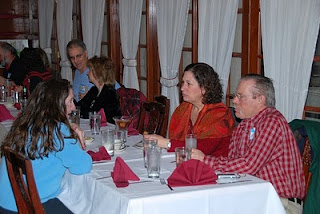When life gets hard, we often retreat into ourselves. We detach from others, brood, feel sorry for ourselves, and generally cut ourselves off from our network of family friends and colleagues. We think we need time to “sort things out.” Yet this is the last thing we should be doing. Staying connected with people actually helps us survive and thrive. Ultimately we spiral up and out of our funk.
In keeping with my new year of resolutions, I took to the social investment front (principle #7) beginning on Friday evening with the Numega alumni crowd. As I made the rounds greeting old friends and former colleagues I heard again and again “Pat, what is different with you? New hairdo? Lose weight? What?” These comments had me curious. I have not changed my hair or lost weight, yet as I mulled these comments over in my mind, it occurred to me that the only thing different is my practice of the Happiness Advantage and following Shawn Achor’s 7 principles. The changes that people are seeing are not on the outside of me, but coming from the inside of me.

As I left work Friday after a particularly stressful day, my head was not in the party mood. My thoughts roiled in the old Pat way feeding on the very blackness those thoughts produced. Then someone cut me off, and I missed my exit. I tried to call a friend that I’d be delayed and my cell phone repeatedly explained to me that “all circuits were busy.” That was it. I pulled off at the next exit, parked myself at Panera ‘s ordered a salad and pulled out my notebook. I’ve been keeping this notebook as a way to argue with myself, review the principles and record other tidbits that help me stay on the path of the Happiness Advantage. By the time the salad was done, I was back on track, felt much better, and had reviewed memories that produced inward and outward smiles (principle #1). The invisible hand that guides me knew I was in no frame of mind to take full advantage of the reunion until I had washed the days stress out of my head.
Before I could sit back long enough to enjoy the benefits of the Numega reunion, I was off to the New England Rider’s holiday party. (Always in January as the real holiday season is just too hectic.) As I greeted old friends, Andy selected a place to park our coats. When it came time for the meal, we found ourselves alone at the end of a long table, with others at the circular tables in the room lending to a more intimate gathering. I remarked to Andy that he could have selected more convenient seating so that we could have a conversed with the others by proximity. I looked up from my plate and a hand shot up and waved in my direction. The smile it produced on my face reached inside to my soul.

As the evening progressed and with the meal over, one by one the ladies and gents wandered over to sit with us and chat. The New England riders have always been a welcoming and friendly crowd. You are always treated like family, they have concern for one another, and every member from the newest to the oldest feels the welcoming warmth that radiates from this group. Could it be the New England Riders have always know intuitively how much social investment pays back in good health and longevity? It would seem so because every effort is made to ensure that deposit are made that will ensure dividends.
This morning as Andy and I review the evening, he is telling me how good it felt to see all the ladies come over and speak with me. “They looked over and said ‘Pat is one of us, I’m going over to say hello’ “. Andy is of course practicing a principle without the realization. One could say “the ladies felt sorry for you sitting all the way over here alone” yet he gave himself a counter fact in them recognizing me as one of their own. I like his thinking and it’s just as valid as any other thought.
My current audio book is “Healthy at 100” by John Robbins, and in all the good advice this audio book has for health and longevity, the one theme that occurs over and over, is the social connection the elders in our society have with the world. The Beatles it seems knew what they were talking about after all. We can feel vindicated in our parents shaking their heads over those long haired weirdo’s. We do indeed get by with a little help from our friends.
Oh, I get by with a little help from my friends,
Mmm, gonna try with a little help from my friends
Ooh, I get high with a little help from my friends
Yes I get by with a little help from my friends,
with a little help from my friends











